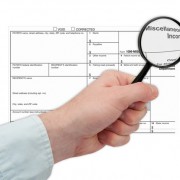Form 1099 Filing Requirements – What You Need to Know
Forms 1099 are “information returns” that businesses are required to file annually with the IRS. The forms are used to report amounts a business paid out that should be reported by the recipients as income.
Form 1099-MISC, Miscellaneous Income, is probably the most familiar to business owners. But Form 1099-MISC is just one of a group of more than fifteen different forms used to report other types of income to the IRS.
To increase compliance of Form 1099 filing, business income tax forms include questions about whether the business made payments that require issuing the form and whether the business actually did issue it. This scrutiny, coupled with steep penalties, make it important for every business to check Form 1099 filing requirements each year.
Here’s what you need to know about Form 1099.
COMMON 1099s – A variety pack
Under current tax law, every person engaged in a trade or business, including nonprofit organizations, must file Forms 1099 for certain payments made during the year in the course of the payer’s trade or business. Here are some of the most common forms and filing requirements.
- Form 1099-INT
Used to report interest payments of $10 or more by financial entities; $600 or more by certain trades or businesses. - Form 1099-DIV
Used to report dividend payments of $10 or more; $600 or more for liquidations. - Form 1099-B
Used to report any proceeds from broker and barter transactions. - Form 1099-R
Used to report distributions of $10 or more from retirement or profit-sharing plans, IRAs, SEPs, annuities, or insurance contracts. - Form 1099-S
Used to report the sale or exchange of present or future ownership interests in real estate. - Form 1099-C
Used to report cancellation of debt of $600 or more. - Form 1099-MISC
Used to report miscellaneous payments generally of $600 or more; $10 or more for royalties; any amount for fishing crews.
1099-MISC – The major business form
Form 1099-MISC is used to report payments for services provided to your business by unincorporated vendors when those payments total $600 or more for the year. Typical payments include rents, royalties, and compensation to independent contractors, such as consultants, web designers, accountants, lawyers, and cleaning services.
Here are five conditions for payments that must be reported using Form 1099-MISC.
- The payment was made to a nonemployee.
- The payment was made for services (not goods) provided to the trade or business.
- The payment was made to an unincorporated entity (except for payments to attorneys and medical and health care payments).
- The payment or payments generally totaled $600 or more for the year.
- The payment was not made electronically (e.g., with a credit or debit card or with PayPal).
DEADLINES – When to file
January 31 – Give one copy of Form 1099 to the recipient of the payment by this date of the year following payment.
February 28 – Send one copy of Form 1099 to the IRS by this date of the year following payment unless the form is filed electronically.
March 31 – If Form 1099 is filed electronically, this is the deadline for providing a copy to the IRS.
NOTE: Electronic filing is required for businesses filing 250 or more information returns and optional, though encouraged, for businesses filing fewer than 250 information returns.
PENALTIES – A matter of intent
The penalties for failing to file Forms 1099 range from $50 to $250 per form, depending on how late your filing is and whether or not the failure to file was intentional. Total penalties can go as high as $1 million for businesses with gross receipts under $5 million or $3 million for those with gross receipts over $5 million.
To increase compliance of Form 1099 filing, federal income tax returns for businesses include the following questions:
- Did your business make any payments during the year that would require it to file Form(s) 1099?
- If “yes,” did or will the business file required Forms 1099?
MORE HELPFUL FACTS
- If you receive a Form 1099 with an incorrect dollar amount, request a corrected copy from the payer before tax filing time.
- Only trades and businesses are required to report payments made in the course of business on Form 1099. No reporting is required for personal payments. For example, a business owner who pays a dentist $1,500 for a child’s dental work does not need to report that payment on Form 1099.
- Payments of $600 or more to attorneys in the course of business must be reported on Form 1099-MISC, whether the attorney is incorporated or not. Medical and health care payments made to corporations must also be reported.
- Payments to vendors by credit or debit card, or by services like PayPal, should not be reported on Form 1099-MISC. The bank or third-party payment provider is required to report those transactions on Form 1099-K.
- Nonprofit organizations are subject to Form 1099 filing requirements because they are considered to be “engaged in a trade or business.”
- The fact that payments may not have to be reported on Form 1099 does not mean that the payments are exempt from income tax. All income must be reported on the income tax return of the recipient.
- To properly complete Forms 1099 and avoid penalties, a business needs the recipient’s name, taxpayer identification number, and a mailing address. Obtain this information by sending the recipient Form W-9, Request for Taxpayer Identification Number and Certification. If the recipient fails to provide the necessary information, the business may have to withhold taxes from payments and remit these amounts to the IRS.
AN ACTION LIST – Staying compliant
- Review accounts payable and cash disbursements to capture reportable payments.
- Verify that the information on Form W-9 is current for each vendor.
- Initiate a policy that no vendor will be paid unless Form W-9 is completed.
For additional information about the Form 1099 filing requirements that apply to your business, please contact our office.


